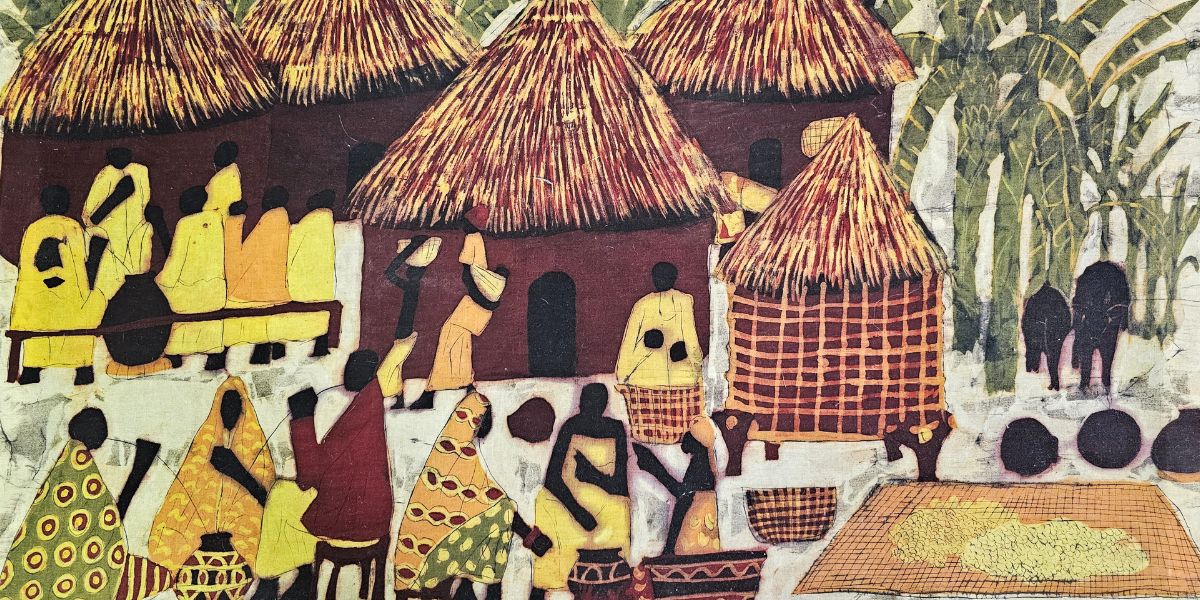
In recognition of African American History Month, Yakima Valley Libraries (YVL) is pleased to share the stories of the African American Players Club, the African Village Cultural Center, and their founders, Roho Shinda (Thelma Patillo) and Fundi Shinda (Charles Patillo).
Did you know the Yakima Valley has an African Village? Located on the Yakima Training Center rests what remains of a once vibrant cultural center for Yakima’s Black community and culture. The solitary rotund building was once the theatre and school for the Afro-American Players Club. To the members of the club, the center was known as the Njuzi Kibanda (Knowledge Hut).

This building serves as the legacy of its founders Roho and Fundi Shinda, also known as Thelma and Charles Patillo, and their efforts to bring a center to the community that focused on teaching Yakima’s Black youth about African culture through educational means. After moving from Los Angeles to the Yakima Valley in 1965, the Fundis spent time developing the African Family Unity Center in Maple Valley, Washington to help urban Black youth connect with outdoor activities like gardening and raising poultry. One year later, the two found that there was no center for African American youth to learn more about their culture in Yakima. Thus, in 1967, the Afro-American Players was formed as a theater company that featured an ensemble of exclusively African Americans. Later in 1971, thanks to the generosity of both the Shindas for their donation of 11 acres of land for the center and three donations of funds from the Episcopal Church, the African American Players Club had a place to call home. The African Village Center also included another enriching environment of a community garden and poultry farm.
According to an appraisal of the program, the Shindas believed that a culturally focused drama program would instill “Black pride and Black Self-Respect [that] can be developed through Black Drama.” The players performed in many Central Washington communities including Yakima, Ellensburg, Pasco, Grandview, and Richland throughout the late 1960s and through the 1970s.

Aside from producing plays, the center also held classes where students learned Swahili, Afro-American history, journalism, filmmaking, art, music, and dance. The range of productions the players produced were primarily stage plays; however, they also produced a television special titled Black Christmas in 1969 and a fashion show in 1971. The fashion show was held in Washington Park (now called Martin Luther King Jr. Park). Directed by Elwood Honore, the show featured men and women wearing fashion that highlighted Black culture and music. Businesses including Nordstrom-Best, Shannon Boutique, and Freedom III all contributed to the show’s featured apparel. The players contributed a poetry reading that focused on Black people’s beauty and a musical performance from its members. The center also was intended to be used as a cultural hub for the community. In addition to this, two separate regional conferences were held in the center as was intended by the founders of the organization.
The players club faced a devastating blow when Fundi Shinda passed away in 1990. Afterward, Roho spent her time actively advocating for civil rights.

While living in Yakima, Roho Shinda met U.S. Supreme Court Justice William O. Douglas. Douglas later claimed his conversations with her “informed his understanding of the discrimination that blacks faced in the United States.” In 1999, Roho was honored with the Women of the Year by the Larson Gallery and Yakima Valley Community College Women’s Program. In 2001, she visited South Africa for the United Nations World Conference Against Racism. In 2011, she returned to live with her family where she passed away that year. To commemorate her legacy, a sculpture was installed at the Millenium Plaza after her passing. The piece is titled the Sankofa Bird which is the symbol of the Ghanaian proverb, “It is no crime to go back and correct what you have not done.”
The African Village structure that still stands today has since been sold in 2015 and is not accessible to the public. It is a testament to the hard work of the Fundis and the community they supported. The shape of the structure, which is modeled after an African Coptic Church, reflects the rich culture it was trying to invoke and ultimately preserve. Perhaps choosing a church’s shape also reflects another important part of community building belief in a cause greater than oneself.
-Written by Carlos Pelley
Yakima Valley Library’s Northwest Reading Room is responsible for a collection of newspaper files that have been curated and preserved by previous librarians of the Yakima Valley. This collection includes information about the African American histories and life stories of the Yakima Valley. Other documents researched for this blog included the historical documents of the Afro-American Players Club collection located at the Yakima Valley Museum. Carlos Pelley, the Archivist and Special Collections Librarian, conducted research using these collections.
If you would like to explore this and other stories of Yakima Valley, visit the Northwest Reading Room at Yakima Central Library, where Carlos and Matt can assist you in your research. Learn more about this library service online or email us at archives@yvl.org.
References
COOPER. (1999, July 9). 1999 Women of the Year — Two Women Honored for Local Cultural Efforts — Sue Rigdon and Roho Shinda. Yakima Herald-Republic (WA), pp. 2E-5. Available from NewsBank: Black Life in America: https://infoweb.newsbank.com/apps/news/document-view?p=AAHX&docref=news/0FCDEB0B2B0B38C6.
Fashion to highlight summer evening. (1971, August 8). The Yakima Herald-Republic, 4C.
Menuez, B. (Ed.). (1970). General Convention Special Program. Executive Council of the Council of the Episcopal Church.Yakima civil rights leader leaves a legacy. (2011, August 28). Yakima Herald-Republic (WA). Available from NewsBank: Black Life in America: https://infoweb.newsbank.com/apps/news/document-view?p=AAHX&docref=news/13970620471EE040.